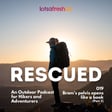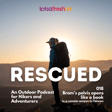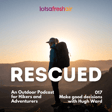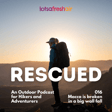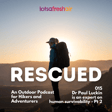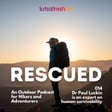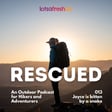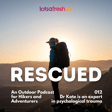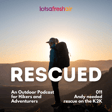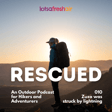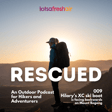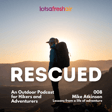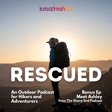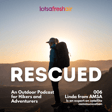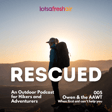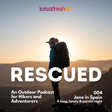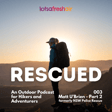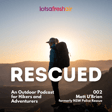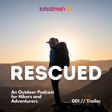Become a Creator today!Start creating today - Share your story with the world!
Start for free
00:00:00
00:00:01

007 // James is Buried Alive
In what must be the most basic of human fears, James woke up to find himself buried alive.
Outside, the wind buffeted the Main Range, out past Mt Kosciusko, but all was quiet inside his cosy, white snow cave.
In this episode of Rescued, we hear from James and his mate Dylan, as they talk about their two very different experiences of this epic backcountry adventure and how escape was just the beginning.
Sincere thanks to James for sharing his very personal story.
Thanks to sponsor Paddy Pallin
Transcript and show notes TBC at https://lotsafreshair.com/category/podcast/
Transcript
Introduction to 'Rescued': Themes and Overview
00:00:00
Speaker
Rescued is a podcast of conversations with rescuers and those who've been rescued. It's about the lessons we learn about ourselves, the places we go and why, without judgment, to help us have better adventures, manage risk and deal with the unexpected.
James's Snow Cave Awakening Experience
00:00:17
Speaker
In what must be the most basic of human fears, James woke up to find himself buried alive.
00:00:25
Speaker
Outside, the wind buffeted the main range, out past Mount Kosciuszko. But all was quiet inside his cosy white snow cave. In this episode of Rescue, we hear from James and his mate Dylan as they talk about their two very different experiences of this epic backcountry adventure and how escape was just the beginning.
00:00:49
Speaker
So let's kick it off. It's the first time I've ever had two people here in the podcast together. So it's great to have James and Dylan here in the rescued podcast studio with me, well, virtually online. And let's start by how you guys know each other. How did you guys get to become mates to find yourselves out on an adventure? And I'll start with James.
00:01:12
Speaker
Dylan and I met during Cert 4 at doing Outdoor Recreation at the Blue Mountains TAFE. We weren't in the same year group. Dylan was like half offset to me. So we only lined up on a few different
Journey to Outdoor Recreation and Challenges
00:01:25
Speaker
courses. We both had completed our Certificate 3 in Outdoor Recreation and then landed together on this skiing course as part of our Certificate 4. And yeah, staggered in terms of where we did it, but that was the one bit that we overlapped for a number of weeks.
00:01:41
Speaker
Got it. Got it. So, I mean, that course sounds amazing. Why did you guys do that course? So, James, when you started the certificate three and four in that outdoor rec, what was your end goal? What were you hoping to do? I didn't really have much of an end goal after the end of high school in general.
00:01:58
Speaker
So there was a certificate three offered down in Sydney. So I did that course and just, yeah, the Cert 4 was only offered in the Blue Mountains. So me and a bunch of three other friends that did the Cert 3 course moved up to Wentworth Falls and we did the Cert 4 course. So how old were you at the time? I went straight from high school into Cert 3, 18, 19, 20. Yeah. And Dylan? I think I was 24 in 2005. I've had a few more years on James.
00:02:26
Speaker
Let's go to the snow component of this course. So talk me through some of the skills that you learned going into those five weeks in the snow. It was a pretty, I mean, it was an intense course. It's like an extreme environment, essentially. Like it's bushwalking and it's cold and it's freezing and there's no, there can be just relentless out there. There's no, you can't just hide from it. You learn how to recognize your limits and how to stop before you get there.
00:02:54
Speaker
Do you think that's why they did that? I guess I've always just assumed that that's what they were doing. I don't know. Apart from the experience we're going to talk about in detail, what are the other memories?
00:03:05
Speaker
Dylan, that you have of that time in Gindi and down at the snow. The three weeks that we were out as a class in the bush, we experienced quite a variety of weather conditions and snow conditions. And we had people with quite significant injuries who left the program and then came back a few days later with various treatments and things.
00:03:27
Speaker
So it was an excellent opportunity to push yourselves, but with really experienced instructors who made sure that it was at your limit, not beyond adventure, not misadventure.
Preparation and Technology Reflection
00:03:39
Speaker
And it was done really well. So let's jump to this day when you parked your car at Dead Horse Gap.
00:03:48
Speaker
And just for all of us, can you just explain where Dead Horse Gap is in relation to some other sort of places that people might be familiar with? So Dead Horse Gap is sort of mountain pass, I guess, behind Shredbo. Dead Horse is the ridge of the main range as well, right? It's the closest you can drive, I guess, to get to like the main range, other than like coming from that gothiga side of the valley.
00:04:12
Speaker
What kind of preparation and planning did you do to prepare for this? Or was it right on the back of you finished a face-to-face class the day before and then the next day out you go? The preparation that we undertook for this adventure was that we looked at the forecast as long as we could in advance because leaving technology behind, you can only look so far in advance to see what that could be. We were planning on being out for
00:04:40
Speaker
beyond the four-day window that the forecast reliable at the time. So we had a variety of devices for communications and safety and things. So we had our mobile phone at least, a GPS for locations, which if you get a whiteout, it's a nice thing to have, a satellite phone and a PLB were four devices that we had. And you got to remember, this is 18 years ago.
00:05:05
Speaker
So the technology
Facing Winds and Shelter Decisions
00:05:06
Speaker
was very different. We didn't have GPS's on our phones and we didn't have satellite messaging services. Sat phones were quite bulky and mobile phones were very rudimentary. You could play snake and send a text message was kind of like the boundaries of the technology. So it sounds like, okay, you had technology, you had your food. How many days were you seeing yourselves going out for?
00:05:29
Speaker
been at least five or six days, right? I vaguely call the five day loop and return to Dead Horse Gap was amended fairly quickly once we headed up onto the main range. So, James, tell me about that. Tell me about, so you've left your car at Dead Horse Gap and you got your skis on and you're heading up. What happened next?
00:05:48
Speaker
I definitely underestimated how much worse it gets above the tree line, I think. I don't remember what the weather forecast was, but we were going out regardless. So we ascended the ridge of Dead Horse Gap and we got above the tree line and we were
00:06:05
Speaker
just cruising onto the ram's head sort of range and the wind was just unrelenting. You just, you could not look into the wind. So tell me about the wind, Dylan. How is it affecting the way you were able to move about?
00:06:22
Speaker
It started with sort of being, you know, coming onto a ridge and going, oh, that's a bit breezy to to the point where we were being blown over by gusts of wind being blown off the ridge, really struggling to make progress and then having limited communication between us. You sort of have to huddle up and make a wind break to be able to look at your map and things like that. And so, James, what was your what were your plans for
00:06:48
Speaker
how you would stay overnight. Were you planning to sleep in tents or what was the sort of sleeping accommodation ideas? During the course, I fell in love with snow caves and igloos and that part of the adventure, I guess. I packed a shovel and I feel like Dylan had a Megamid. Worst case, that's big enough I can squeeze in there if it push comes to shove. Otherwise, I'm digging a snow cave or an igloo.
00:07:14
Speaker
Yeah, so tell me about what you learned about digging a cave for the night in the snow. I guess the basic principles are like a snow cave is easy to dig when you've got like the side of a hill that you can sort of
00:07:27
Speaker
dig into. In Australia you generally need you know looking for quite deep snow which means you're often looking for I guess the lee side of the hill where snow sort of being extra additional snow has been deposited. You would think that they are cold but they're actually extremely well insulating. Inside it can be really warm.
00:07:45
Speaker
and it's going to be really quiet and you're going to have a much better sleep than if you're in a tent was my personal opinion. And as long as you keep your door clear, they don't have a limit for snow loading, like a tent after about 10 or 20 centimeters of snow on a tent, your tent fabrics touching your face. So take me through to the afternoon when you realized you needed to actually start
00:08:09
Speaker
making plans for the night that we're going to talk about. After the wind had abated somewhat, we skied up onto Mount Koziosko. We spent some time with a young couple who proposed to each other. Well, just before we'd arrived or just after. And so, you know, help them take a photo and share their bubbly, things like that.
00:08:33
Speaker
And then skied down to a safety hut that's nearby Mount Kosciuszko called Siemens Hut and spent a night camping near there after leaving Siemens Hut. We went to Charlotte's Pass.
00:08:46
Speaker
to get an update on the weather and then headed off to Blue Lake. And for those of us who aren't familiar with the area, talk me through what Blue Lake is and describe how it looks. I think all the lakes up there, like Club Lake and Blue Lake, it's like an amphitheatre of snow. Yeah, you've just got this
00:09:08
Speaker
awesome in a big sort of flat snow sort of field heading into this wall of snow and rocks and rock and ice. And it actually starts to look like mountains, which is a rarity in Australia.
00:09:24
Speaker
of altitude are we at here? I mean the tops of the peaks on that ridge above the lakes are around 2,100 metres, 2,200 metres. Yeah, in that kind of ballpark. So the lakes I think are sitting at about 1,800 metres. The afternoon is steadily approaching. Your
00:09:46
Speaker
over the back end of Blue Lake and you're starting to think about setting up somewhere for the night. What are some of the choices and the things that are going through your head at that time,
Building and Buried in a Snow Cave
00:09:57
Speaker
Dylan? Making your way towards Blue Lake.
00:09:59
Speaker
We briefly headed up to the lake to have a look, but as the sun was starting to get low, we thought it was a good time to go set up camp. And so we descended again onto the lee side, sort of just out of the wind, which wasn't too bad, just out of the breeze. So we'd have a calm camp and set up a camp that night.
00:10:20
Speaker
And what are you looking for apart from something out of the wind? Anything else? We were looking for a place that was relatively out of the wind and flat. But other than that, we didn't have too many requirements. James, on the other hand, planning to sleep in snow shelters was again looking for those things that he'd mentioned earlier, which were a lee side slope with a depth of snow that he could dig into to make
00:10:46
Speaker
a snow shelter. And the type of snow shelter that he built that night, I think you would describe, I think it's called a coffin. It's a, it's a very small shelter, which involves digging sideways into the slope and digging a bench that you sleep on. I like to, I like to call, prefer to call it a bench or a shelf. A coffin. A bench or a shelf. A coffin's way more ominous.
00:11:13
Speaker
Talk to me about, can you remember James, as you picked up your shovel to start that first dig into the snow, what you were trying to achieve? The weather was just beautiful. It was blue skies. The forecast was looking good. I really didn't feel like I needed much of a shelter or much of a cave.
00:11:35
Speaker
had the intent, like the hill that we'd picked was sort of facing east. So I was like, oh, I just, I'll cut myself a nice big open shelf. You know, there's no bad weather coming. I don't need that much protection and I'll be able to just, you know, I just need a bit of cover over the top of me and I'll be able to watch the sunrise over Charlotte's pass.
00:11:54
Speaker
Was it open the full length then of the bench? Not the full length, but it would have been like a metre and a half wide opening. So I could be laying down and just looking out over Charlotte's Pass and the main range.
00:12:08
Speaker
So how far away was the tent from the cave? It definitely was far enough that the walk from the tent to the snow cave was a pain in the butt in the middle of the night. Because James wanted to be camping on a slope and to throw his snow down the hill and we wanted to be on the flat bit a little bit further away. So it was definitely more than 10 metres.
00:12:30
Speaker
You checked the forecast at Charlotte's Pass. It looked like it was clear for the days ahead. Like you said, blue sky, perfect conditions. What happened as the sun went down? What happened as it got darker? It turns out we hadn't learned our lesson about the wind.
00:12:47
Speaker
We once again had looked at the blue sky, no precipitation. This is going to be a lovely time. We set up our camps, went to bed, and I distinctly recall waking up at 1 a.m. with my tent flapping madly, going, oh, the ruddy wind, and thinking to myself, gee, I wish I was in that snow cave right now because it would be warm and quiet. And I put in my earplugs and attempted to go back to sleep.
00:13:17
Speaker
What about the Land of Nod for you, James? How was it in the cave? Did you fall asleep fairly easily? I was having a great sleep, so I didn't set any alarms to wake up because there was no forecast of snow. I woke up a few times, you roll over in bed, and I looked at the door, sort of peaked.
00:13:40
Speaker
I could pick up my backpack to block the wind. I remember peeking past and going, I thought I could still see the night sky and roll back over. I don't know how many times I would have done that, but at one point I stopped and I was like,
00:13:59
Speaker
I don't think that looked quite right. I was sort of lying there thinking about it and I was like, yeah, something's definitely not right. And I pulled my bag down and it was just a wall of snow. There was no door there anymore. You said you didn't set any alarm. Is that a normal thing to do in a snow cave? Good practice, I would say, is that you should have some sort of alarm system to wake you up and
00:14:27
Speaker
You're really setting that alarm based on how much snow you're expecting to fall, I guess. If it's a heavy snow night, like an hour, you want to be waking up every hour to check on things. And that moment when you pulled your bag back and you just saw this wall of white, can you remember what was going through your head at that time?
00:14:52
Speaker
uh yeah it was it was it was all like the classic signs of shock and grief you you just didn't i just didn't believe it you i sat there looking at it going oh that's a bit strange there was a bit there was a little bit of a gap you know because obviously the snow doesn't make a perfect seal up against the roof of the door what you know of what was the door frame so you just i just pushed my hand in
00:15:19
Speaker
wasn't the doubt in my mind that I would push my hand into that gap and punch out into the real world and that would be the end of it. And then that didn't happen. And then you just sit there in disbelief again and you go, that's a bit strange. And I look around in the snow cave and I find my shovel and I grabbed the handle of the shovel and I pushed that through the gap thinking,
00:15:46
Speaker
not a doubt in my mind that it was just going to push through into the outside world and it didn't. The doorway that I'd cut, like the depth of the entry sort of between the snow wall and what was the snow wall in my sleeping area would be less than a meter plus a shovel. That's over a meter. So I didn't think there'd be more snow than that.
00:16:10
Speaker
When I did push my arm through and shovel handle through the depth that was the doorway. Yeah, it was I guess my brain wasn't comprehending what situation I was in. And do you know what time this was? My concept of time was so far out of whack. There's hours of that night that I cannot recall. And I did make a journal, a diary entry when I was in the cave.
00:16:40
Speaker
And I probably would guess that that would have a timestamp on it, maybe. I've actually never read that. I've never read that diary entry. I still have the book on the shelf, but the page is taped shut. So you can't accidentally open it. And what led you to write in the journal?
00:17:00
Speaker
It was at the point where I'd given up. After not punching through with my hand, my next step was, okay, well, I'll get the shovel blade and put my shovel together and I started cutting out and cutting the blocks.
00:17:17
Speaker
cutting blocks of snow out of the doorway and throwing them to the side of the snow cave and still in my sleeping bag at the moment. So I dug in about a metre of the depth of what the door used to be and still hadn't made my way out into the real world.
00:17:33
Speaker
And then I guess I progressed into the next step. I got out of my sleeping bag. I put on a few more clothes and dug a little bit deeper. And there was a few, probably the thing I noticed actually was how short of breath I was and how quickly I was, you know, how little effort was taking for me to become breathless.
Emotional Struggles and Rescue Efforts
00:17:54
Speaker
And, you know, this was at a time when I was probably the most fittest, the fittest I've ever been.
00:18:01
Speaker
Once the oxygen gets below a certain level, you just pass out and there's no two ways about it, right? There's no choice in the matter. It's just oxygen gets to a level and you shut down. And I had that thought when I was sitting there breathing heavily. I felt like I wanted to stop and write something down because I didn't
00:18:25
Speaker
I wanted to, I don't know what I wanted to do. I guess I wanted to say goodbye and maybe explain, I don't know, explain the situation. I can't remember if I'd been, I can't remember if I'd gone through the angry phase by the time I did the journal entry. I remember being angry at Dylan. So talk me through those, those emotions. So do you recall that they were changing?
00:18:48
Speaker
Yeah, big time. Yeah. And especially, I don't remember if I recognize them in the moment, but I definitely recognize them like reflecting on the situation. And I can't remember what, like now I can't remember what order they came in, but I remember like after the fact, looking back at it and going like that's just
00:19:09
Speaker
textbook, right? Like you went through all the, all the, all the exact emotions in the order they tell you, you're going to go through them. I went through them. I was shocked. I was in disbelief. I was, I didn't, I was in denial. I was angry. I was sad, you know, and that angry phase, I don't think I don't remember it lasting very long.
00:19:29
Speaker
But I did get very angry at Dylan because I was like, if there's this much snow, his tent can't handle that much snow. He would have been out of his tent 10 times. Like if he had the same amount of snow on him as I did, he would have, he, he, that means he'd been out of his tent 10 times to dig himself out and not once did he come and help me. That was, you know, that was, that was the angry phase.
00:19:53
Speaker
And meanwhile, Dylan, with your earplugs in, in the mega-mid, what was happening in your sleep that night? Myself and our friend in the tent with me were having a very windy night. And my friend who was in the tent with me was fully dressed in their clothes inside their sleeping bag with all of their things packed in their bag because they were so worried that the tent was going to blow away. It was that windy.
00:20:20
Speaker
And the reason that we didn't get out of our tent 10 times to take the snow off our tent is that where James had dug in his snow cave was in the lee of a slope. We, unfortunately, were exposed to a lot of wind. And so the snow didn't get a chance to settle on our tent. It just got blown straight off. So we were just copying it and so there was no snow settling on our tent.
00:20:47
Speaker
Massive thanks for the support from the team at Patti Pallon, who since 1930 have been leaders in travel and outdoor adventure. In fact, did you know that Patti himself, a member of the Sydney Bushwalkers Club, was a volunteer in the original Search and Rescue Arm of the Federation of Bushwalking Clubs in New South Wales? Hmm, nice one Patti. So James, take us back into the cave. Just because I'm curious, what are the dimensions inside the original space that you'd
00:21:17
Speaker
dug out for yourself on this bench. Like the sleeping area, not including the doorway, and like a metre and a half wide, two and a half metres long, and enough room for like a metre and a half tall, so like enough room for me to sit up in. Not massive, I guess like a single person tent kind of sized space.
00:21:37
Speaker
You'd started cutting out blocks, you'd said. You'd built your shovel and started cutting out those blocks, and you're starting to feel the changes in the air and the taste. Physicality-wise, you've got this small space that you're working within. What do you do with the blocks in the snow that you're trying to cut out? Because you've got really nowhere to put it. What's that about?
00:22:06
Speaker
Yeah. Once I would have been, I don't know, like a meter and a half or two meters, something into the doorway, like that snow was taking up like probably a third, a third of this, like, you know, what was my sleeping area? Snow was building up on all my
00:22:26
Speaker
all my things on my mattress, on my sleeping bag, on my backpack, on all my food and cooking equipment. Everything was starting to get covered in snow pretty quickly. I distinctly remember going into that next step of, no one but you is getting you out of this situation.
00:22:46
Speaker
There is no one but you. You can't stop, I guess, essentially. You can't give up because, for whatever reason, Dylan's not coming. You've got to keep going until you physically can't keep going anymore. Did you keep doing the same strategy of trying to dig through what logically would fill the quickest way out, which would be the door?
00:23:13
Speaker
There was two stages, I guess. The first stage I went back into was continuing to dig out, but I reduced basically the tunnel that I was digging to the width of a shovel blade tall and two shovel blades wide.
00:23:30
Speaker
30 centimetres by 60 centimetre tunnel. I dug that out for probably another full body length. So it's my, I'm under 96 centimetres tall. So and plus the, so my, you know, my arm reach
00:23:49
Speaker
plus half a meter for a shovel. So we're getting close to four meters. That's how deep my tunnel had got and I still could not get out. What I had become concerned about was I now suddenly digging into another slope and now I was suddenly tunneling into the side of a hill instead of into the side of the next hill. So I went looking for my ski poles.
00:24:13
Speaker
So I'd left my ski poles marking my entrance, so I knew they had to be somewhere in the snow, give or take somewhere where the door used to be.
00:24:23
Speaker
So yeah, I found a ski pole eventually and I got that ski pole and I drilled that all the way through the roof basically up to my shoulder. So that's essentially three meters and it popped out. And the feeling of that is the feeling of
00:24:45
Speaker
I can't say I've ever experienced again in my life and every emotion, like all the emotions just come rushing, come rushing into you. That was the, the fresh dump of fresh air just coming straight in that hole. It was just, yeah, I've never experienced a feeling like that feeling in that moment. And what changed for you in that moment?
00:25:11
Speaker
I was, I was fine. The experience was over. Like crisis had been averted. I was alive and I, you know, I went into, I don't know if my brain just was just like, I think, I dunno, I guess adrenaline probably was just this massive dose of adrenaline. I just took my shovel and I wildly swung at the roof and dug myself a vertical tunnel out of this little space.
00:25:37
Speaker
which was unsuccessful because I'm not that tall and I couldn't climb out of my vertical shaft. And then of course all that, you know, all that snow, that tunnel, vertical tunnel of snow just like landed all over my sleeping gear, all my backpack, everything. And I've probably, I think I stopped for a minute and was like, all right, it's okay James, it's okay. You know, we're out of this, we can calm down, slow down.
00:26:07
Speaker
But were you out of it yet? Apparently not. So you're madly digging at the ceiling to widen that vent hole that you'd screwed through and broken through. Do you have any concept of the time that that would have taken?
00:26:25
Speaker
No, not at all. No, I was half dressed. I think I dug proper steps. I was like, take your time. You got time. Just dug steps out of that, out of that hole. I ran down to Dylan's tent and opened his tent and said, Oh, Dylan, I need a hand to get my stuff out of the tent. Can you come and help me?
00:26:47
Speaker
Dylan, what's your memory of that moment when James came knocking or shaking at the tent door? I hadn't been sleeping too well, and so it wasn't like he disturbed me from a deep slumber, but there was definitely the, what on earth is this person doing unzipping our tent in the middle of the night?
00:27:07
Speaker
covered in snow and yeah ice through his hair beard and half dress wearing thermal top rain over pants you know the older over the shoulder brace styles and my recollection is what James said was I'm glad to see you guys and can you come and help me get my stuff out of the cave.
00:27:29
Speaker
Our suspicion was that we had a brief moment after he said, you know, can you give me a hand? He ran off and we had an opportunity to talk amongst ourselves and I went running to go get his gear and you're still crazy. Still very like on a high and adrenaline and all those sorts of things. I dove head first down into my hole.
00:27:50
Speaker
Wow. So the hole that you'd just spent hours trying to dig out of, you just dived headfirst back into. Yeah. The one thing I do remember was that on my student budget, I bought a very expensive santo compass and I was like, I was not getting out of that hole until I found that compass. So tell me about the urgency and why you were so fixated on getting the gear out and why that was a focus at that time.
00:28:20
Speaker
Like I look back, I look back now and my behavior over this next 12 hours less. It's probably the most disappointed I've been in myself in my decision-making. In this moment, the near-death experience to me, it didn't register the significance, I guess, of the event, right? Like I'd lived this experience and I was thinking about where we were going to go skiing that day.
00:28:46
Speaker
Dylan was the one that talked me into going back to Charlotte's to check in and going home because this was a serious thing and we shouldn't be out in the middle of nowhere anymore.
Decision to Return and Emotional Challenges
00:29:01
Speaker
Can we just step back just a little bit thinking of all those electronics that you'd brought? I think there was a piece about the PLB.
00:29:11
Speaker
Yeah. So at some point when I was in my cave, I had the PLB in my bag. That was the piece of equipment that I was carrying in the team. And I figured this was a pretty serious situation and I didn't think it would work, but I turned it on.
00:29:30
Speaker
just on the off chance that something did happen. You know, I don't know how often the beep was. It's not very often maybe once every 10 seconds or at one point that beep just got to me. It was like too much of a reminder that you're, you're in a serious situation. So I turned it off. Dylan can probably attest to having a better memory of this, but I feel like I casually mentioned that to Dylan at one point, like it was not a big deal.
00:30:00
Speaker
What I'm hearing is that even though on the outside it appears that emergency averted, it's finished, but it really wasn't over yet, even though that immediate acute danger.
00:30:13
Speaker
My concept of, this is the biggest loss of time that I experienced that night was once I'd collected all my things out of the cave, I came back down to the tent and kicking and screaming essentially, they put me in a sleeping bag and gave me the warmest, sweetest, most amazing drink I've ever had in my entire life. Basically put me to sleep, like put me, you know, told me to have a rest.
00:30:43
Speaker
I think that was the first time I felt my hair and realizing my hair was just a snowball. I couldn't fit my beanie on my head anymore. Dylan, in your perspective then, tell us what was happening and what did you and your other friend do when you saw James at your tent door?
00:31:06
Speaker
James came down and said, I'm glad to see you. Can you come and help me get my things out of my tent? Effectively, I was buried alive and he runs off to go start getting his things out of his tent. We had a moment to talk amongst ourselves and go, hang on a second. What's going on here?
00:31:26
Speaker
So I headed out, I said, James, you head back to the tent, I'll get your gear, don't worry about it. And that's when he went back and put him in a sleeping bag and gave him a warm drink and started dealing with a person in shock effectively. And I started digging for James's gear and he recovered some of his items, but there was a few things that he said, you know, I'm still looking for XYZ and whether that was another ski stock out of the two ski stocks or. I found my compass. Yes, found the compass. But there's a handful of items that he had a shopping list for me to go and get.
00:31:55
Speaker
And we came up with a plan for managing James, but also finding the gear and we took shifts digging and looking after James and coming up with a plan. And so we piece together things like that appeal be had been set off. And so that there might be some implications of that. We piece together that there was some critical equipment that we needed to get out. And yes, we started thinking about all the ways that we needed to address those things.
00:32:24
Speaker
I want to come back to you were saying we needed to manage James or we took turns to take care of James. It seems like the kind of language that you'd use when there was a first aid incident or an emergency or something, someone becomes a patient. Was that something that you both recognized in James that he actually needed some help and support and he probably wasn't aware of his situation?
00:32:52
Speaker
I don't know that either of us at that time were particularly able to articulate what those needs were. We both certainly were very aware of the realities of hypothermia and also being
00:33:13
Speaker
I guess freaking out about the possibility of having almost just died can impact someone in significant ways. And since then, obviously, I've thought a lot more about it and got much more sophisticated thoughts about what was going on. But we certainly knew that we were dealing with someone who needed to be looked after. So as the sun was starting to come up, did that change what was happening for you guys internally and externally? James? For me, I
00:33:42
Speaker
I honestly remember thinking about where we were going to ski that day. I feel like that was almost probably the first thing I asked Dylan about was, you know, whether we should go skiing on like Carruthers or Mount Twynham or Mount Northcurt and being quite put out by the fact that Dylan wanted to call the adventure off. So Dylan, what was going through your head in terms of why you wanted to call it off?
00:34:12
Speaker
So James didn't know that we'd been having lots of conversations outside the tent while he was. Rugged up in his sleeping bag and catching up on some well and disease and knowing that we weren't too far off the end of our week out in the bush anyway, so we weren't going to lose too many days.
00:34:31
Speaker
of valuable power power time. We had made the decision that it was it was time to go home and to go tell the emergency services that if you by the way if you picked up that PLB it was us and we're okay. I do recall that eventually we all agreed that it was a good idea to go and head back to Charlotte's Pass. There's a police station there and to go and let people know particularly about that PLB about what was going on
00:34:58
Speaker
I remember being annoyed at Dylan for the rest of the day. And that affected the decisions that I made. And there was a lot of suggestions that Dylan made later on in the day, navigation decisions, terrain decisions.
00:35:12
Speaker
that I didn't, I didn't really respect his opinion at the moment. And that caused the group and myself to make worse decisions. Cause I was, I was pushing back on his decisions and I was making, I felt like I made the worst decisions that day and they were, they were still letting me make decisions. I was really angry at James. James didn't set an alarm, didn't clear his snow holes. We were in this mess because of James.
00:35:42
Speaker
I don't know when I started feeling those things, but I certainly remember having those similar feelings back in the other direction. It's interesting, that thing when someone needs assistance from those around them, there's a real danger of feeling like your agency has been taken away from you, that decisions have happened external to you that you've not been a part of. It's almost like there's these
00:36:07
Speaker
These other people who normally mean well and we're mates, but it feels like they're conspiring. It's really difficult when you are in the situation when you notice that someone does need assistance, how you manage the group and the tensions and different perspectives on things.
00:36:23
Speaker
And different capabilities. So I was by far and away still the least capable person in the snow in that group. I certainly was a very capable outdoors person by now in terms of leadership and choices around things, but I still was the least capable on skis. And so that absolutely factored into how we proceeded for the rest of the day too.
00:36:50
Speaker
You're in Charlotte's Pass and your friend is overwhelmed and starts crying with all of the stuff that's just happened in the last six hours. How does that make you feel, James? What does she do next?
00:37:05
Speaker
in our sort of debrief, I guess, post, post the event, you know, she had a huge amount of guilt that was coming upon her that she, she also, you know, she didn't get out of the tent to check on us at any point during the night. She didn't think that I was in any kind of danger. And my, my understanding of her emotion in that moment was, was guilt. She was feeling incredibly guilty. I think I told her she was being silly. Like, you know, I hadn't grasped, I hadn't grasped
00:37:32
Speaker
really the seriousness of the situation that I was in, that the group was in, and I probably even told her she was being silly. And there's also just the normal tiredness, let alone the emotional and the physical stuff that you guys had all been going through, and especially you James. From the sounds of it, I think I had the most sleep out of anyone.
00:37:59
Speaker
That's right, because you got put to bed. But yeah, everyone has got lack of sleep. You guys are here before me today. You appear to have a good relationship these days, even though it's now 10 years down the track since you've spoken, just because of the journeys of life. But take me back to Charlotte's Pass. So, Dylan, you've gone into the police station there.
Skiing Back and Physical Challenges
00:38:27
Speaker
What happened next?
00:38:28
Speaker
James was correct in that setting off the PLB hadn't worked in the Snow Cave and hadn't been picked up by anyone. And so when we went into the police station and said, hey, we're the ones that set off the PLB, they're like, what PLB? And there was no process to do anything. They weren't particularly interested in us.
00:38:47
Speaker
They didn't kind of check on us to see how we were going and whether we'd had a terrible experience and anything like that. And when I kind of tried to say it might be nice if someone could give us a lift, their suggestion was to go get the over snow transport and then get back to our car at Dead Horse Gap some other way. But being
00:39:06
Speaker
Poor students that we were and couldn't afford the over snow transport decided in our infinite wisdom that it would be a better idea for us to ski from Charlotte's Pass back to Dead Horse Gap that day rather than make that other paid pilgrimage that we couldn't afford. How long would that journey normally take in in good conditions when you're feeling strong and fit and everything's, you know, everything's going good for you, James?
00:39:34
Speaker
yeah it's like somewhere between 12 and 13 kilometers something like it's depending on how much zigzagging you end up doing with multi-day like you know massive packs on and the skis and gear that we're on like
00:39:49
Speaker
That's a big day. Just that activity itself is a big day. Surely like four or five hours of skiing. And we'd already skied about 10 kilometres from Blue Lake to Charlotte's Pass that morning and effectively been up since 3.34.30 a.m. Looking for gear in the snow, looking after people.
00:40:11
Speaker
So, you've saved your pennies? I reflect on that decision as a parent now and you're just like, how did it not cross my mind to call my mom and dad and say, I need $200 to get to my car? There's no scenario as a parent now where I wouldn't do that. Answer that phone call and
00:40:35
Speaker
find out a way to get my children out of that situation. I didn't ask for help because I didn't think I needed help. Even on reflection, thinking of all the other options that might have even been available to you, your TAFE teachers may actually, were they still in Jindebein or all sorts of different people who, if given the opportunity to help out, probably would have
00:41:03
Speaker
jumped at the chance. But this comes back to that decision-making kind of thing when everything's buzzing and operating at a different path and a different speed to normal. You say calling your TAFE teachers. Honestly, I hadn't even thought of that as an option until you just said that right then.
00:41:25
Speaker
The local TAFE teacher, he lived in Gindi. He probably could have made one phone call and put us on an over snow vehicle because his mate drove the over snow vehicle. 18 years later, and that's the first time I thought of that. I didn't even think of it. You thought of it. How was that not a decision we made, Dylan? I'm absolutely saying both. I think for me, I didn't realize that I needed help. I didn't call anyone because I didn't think we needed help. I thought we were fine.
00:41:52
Speaker
I agree with that. I absolutely agree that we were in the mindset that we were self-evacuating and it was only because we were being cautious. We weren't in trouble. She'll be right. It was just a long walk home to the car now.
00:42:07
Speaker
Do you have a personal story about an incident or rescue during an outdoor trip when something didn't quite go to plan?
Listener Engagement and Debriefing Lessons
00:42:13
Speaker
Maybe you got lost, injured, let down by some gear, preparation or something else. Look, honestly, it can happen to any of us at any time, regardless of how experienced we are. And it's by sharing these stories and tales that we can all learn and help to avoid them in the future.
00:42:31
Speaker
So if that's you, I'd love to hear from you. So please drop me an email to rescued at lots of fresh air dot com. That's rescued with a D. So tell me about that long walk back to the car that you said even, you know, on a good day would have been a big day if everything was normal. I remember not having fun.
00:42:55
Speaker
I remember having very sore feet from just being on skis for prolonged kilometers in either super icy conditions or super poor conditions where you're falling through the snow and continually making poor decisions because our bodies and brains were so tired.
00:43:19
Speaker
unless poor decisions by the route that we take in the first place but then our ability to actually navigate on that route and then our ability to make.
00:43:31
Speaker
to recognize when we were making poor decisions and to fix them before they got worse. The short version is that we didn't do any of those things and it just kept getting worse. So leaving Charlotte's Pass, I mean, the first thing you've got to do is get out of Charlotte's Pass. So that's its own little bowl. And, you know, I thought we had a win. We managed to talk the lift into letting us go on the lift for free to get out of the bowl. He's like, yeah, beautiful.
00:43:57
Speaker
It's like one hill tick, first hill tick. And from there, I mean, it's it's just a long flat slog. You know, we get to the top of thread bow and we were aiming for we were aiming for a ridge that one of the ridges, one of the two ridges that feeds down to Dead Horse Gap. And, you know, this is where I remember challenging and ignoring Dylan's decision making.
00:44:26
Speaker
We had a choice very early on to, we didn't have enough elevation to make the top of the ridge, not by much, but we just didn't have enough elevation. And again, you sort of go back to that, even at the top of thread bow, we could have skied down the thread bow resort and hitchhiked the rest of the way to the car. Even that decision, we didn't make that decision because someone would have to hitchhike and it would be a nightmare. We're going to like gear, we're going to skis. We wouldn't know, you know, no one's going to pick us up.
00:44:55
Speaker
So for people who don't understand what you mean by didn't have enough elevation to get up onto the ridge. Yeah. So the types of ski that we were using there
00:45:08
Speaker
because they're like a lightweight backcountry ski with a telemark binding. So they're kind of halfway between like a, what you'd see a cross country racing ski in the Olympics and like a downhill resorts ski. So they've got shape to them like a, like a resort ski would, but they're light and they're not very good at skiing downhill with, and these ones have got the skis we had, like have like a pattern based to them. So they have a little bit of grip that can walk up the snow uphill.
00:45:38
Speaker
But they don't have a lot of grip, so you can't walk up very steep slopes. So, yeah, we'd got to the start of this ridge and we'd lost too much height, I guess, to stay on top of the ridge.
00:45:50
Speaker
And if you're on top of the ridge, it's easier to follow the path down the hill, whereas once you're on the side, the terrain tends to be a lot steeper, the trees develop faster. It's easier to take the wrong spur and end up in a different feature than the one you want to be on ultimately.
00:46:09
Speaker
I understand. Without even realising it, you're making decisions just through your actions that were going to affect the rest of the day. How did you eventually get to your car and what was those last 5Ks like or the last 3Ks like? What happened?
00:46:27
Speaker
So we had, we had, I remember we had a choice. We had to either climb up maybe 50 meters of elevation, like vertical height to get on top of the ridge. Or we had the option of essentially you call it traversing where you just try to maintain as much height as you can with, but still sort of moving forwards. And, you know, instead of walking that 50 meters up, we, I pushed Dylan and I feel like I pushed Dylan into the decision that we should just traverse and
00:46:56
Speaker
Hopefully we can traverse well enough to get back on top of the ridge. And we never did. And we got further and further away from that top of the ridge instead of getting closer. And the train kept getting steeper and steeper to a point where our skis were no longer capable of going uphill anymore. And so then the only choice is to keep going down and it just gets steeper. And you're in the Australian bush now and you start
00:47:24
Speaker
The snow starts getting thinner and the bush starts getting thicker real quick. It gets so steep that you can't ski anymore and we're falling over with 20-30 kilo backpacks on and falling into the snow and you can't get back on your feet again and at some point you're just
00:47:41
Speaker
it's too steep and there's not enough snow to ski and there's too much snow to walk so you basically you take your skis off and you just start trying to fall and collapse through the snow in the bush and just plod downhill and I mean by this stage it must have been four o'clock in the afternoon I wasn't talking to anyone
00:48:11
Speaker
I don't remember much conversation happening. Everyone knew that I feel like I knew that there was no way to get on the ridge anymore and the only option was to go down. I mean, that's the situation we were in. The only option was to go down and get to the creek and get to the road and find our car.
00:48:33
Speaker
You're at the cars. You've made it at the cars. Are you guys, are you all still talking to each other or is it, you know, the grunts and they're just the nods and the whatever's next to do? Dylan, do you want to talk to that? What ended up happening for most of that late afternoon was that we each had ebbs and flows of the brain kicking back in for a moment or not. And so, yeah, there were some poor decisions made, but I don't want anyone to
00:49:03
Speaker
leave this conversation thinking that James is the only one making poor decisions because it was a team effort. And we did very good at making those poor decisions together in lots of different ways. But when we
00:49:19
Speaker
Did eventually hit the road. We weren't near the car and we had to walk in our ski boots along the road. And so that was one of the times when I feel like I was actually making some good decisions and I made the decision. It was my car and I said, you guys wait here.
00:49:37
Speaker
I'll be along the road to the car and come back and pick you up. I didn't have a heavy backpack, but I still had very uncomfortable shoes. That was it. That was finally once the car started and I ambled down the road a few kilometers to pick them up. That was our journey back into town, which was silent, but not tense.
00:49:57
Speaker
There wasn't a lot of chat, but there wasn't any. It was mostly reflection. And that evening when we got back to, we went and checked into Caravan Park and slept in our tents again that night. But the Caravan Park had like a communal
00:50:12
Speaker
room that we could sort of hang out in with a drying room for our gear and fireplace we could sit around and being the middle of the week and not many
Lasting Impact and Podcast Conclusion
00:50:21
Speaker
people around. We had that space to ourself and had a lot of time to chat and reflect and it was actually a really positive conversation to learn from each other. It was really valuable.
00:50:32
Speaker
It kind of sounds like, you know, those outdoor leadership things are at the end of an activity or a program. You have the, you know, the group debrief moments. And I wonder if maybe you guys hadn't been, you know, outdoor leadership students, but just socially out there, if you actually would have had that kind of a, let's talk this out. Let's debrief what's just happened.
00:50:53
Speaker
I do remember actually this topic being covered as part of one of the courses was the importance of having that debrief at the end of a significant event like this. Without having done that course, I wouldn't have thought to have the importance of having that debrief at the end of that
00:51:17
Speaker
Can you remember some of the things that you spoke about in terms of the takeaways and the learnings for all of us, not just in a snow environment, but in all of our adventures and moments that we step off the concrete into the wild stuff?
00:51:35
Speaker
For me, it was really getting a sense of what the other people had gone through that day, right? And how their experience had differed from mine and having being told that, not interrupting, just listening to, to their story and not making, I guess, any judgment or anything like that. Like you just trying to listen and appreciate what, what, what they went through on that day in that moment.
00:52:01
Speaker
And Dylan, what about you in terms of the forum for talking about it? How do you reflect on that experience of actually just being able to share about it? Telling stories about those experiences, this one and other experiences in my life have always been a great way to process those things that have gone on. But I'll absolutely reiterate that in that particular evening, the fact that we did such a good job of just listening
00:52:29
Speaker
and not interrupting and telling each other stories. I don't remember much of the details, but I absolutely remember feeling like each of us was heard and had an opportunity to speak. And there were lots of silences, too. It was an odd one. But then bringing it out to a bigger picture and a longer term sort of learnings, there's been so many things that have on reflection come back to go, hang on, if I was to
00:52:59
Speaker
do this again or tell someone about what I wish that I'd known then, that there are so many things that I think that I would wish for people. And if I had to pick one thing, though, the one thing that I'd want to share with people out of this is that
00:53:17
Speaker
You can have all the gadgets in the world and all the perceived support networks in the world and all those sorts of things. But in the end, it really comes down to the capabilities that you have within yourselves and within your your immediate group when it comes to dealing with those really
00:53:37
Speaker
bad times in the outdoors, that all those other things, even when they do work, are secondary to that role that each of you plays in those things. And we were very fortunate that we were all very capable people in the outdoors, that that experience that we had, that we got off so lightly.
00:53:58
Speaker
If we were to look at, and you talked about you said just one thing, if you could pick just one thing, Dylan, but there's so many amazing things that we can all learn and take away from the experience, James, that you had and the experience, Dylan, that you've had, which is, as you said, quite different.
00:54:15
Speaker
What are some of those other things you James that you took away and might have been not right at that period of time but might have been months down the track or even years down the track? There's been a couple of things recently that I've been thinking about with some friends talking about skiing adventures and having adventures but
00:54:41
Speaker
There's a couple of friends that have this real reluctance to call for help or ask for help. And that doesn't make any sense. That doesn't make any sense to me. And like, I've been wondering if, you know, an experience like this or some other ones that I've been in, I have no reservation about
00:55:02
Speaker
asking for help. Even as a parent now, you think about these situations that you've been in. I love the outdoors and I would have no dramas with them loving the outdoors and wanting to go on adventures. It's like, how do I prepare them to make good decisions? What about some other learnings, Dylan?
00:55:24
Speaker
I think it's really important to have the support networks, the backup plans, letting people know where you go, having the right equipment, all those sorts of making sure the event you choose is within the realm of feasibility for your skill set.
00:55:40
Speaker
But things are going to go wrong every now and then. And that's OK. But to keep having adventures that I'm a firm believer that the experiences that we have in the outdoors are a great teacher for other things in life. And so I'd hate to see
00:56:01
Speaker
people either personally choosing not to go and have outdoor adventures or our society shifting to a place where outdoor adventures are frowned upon because every now and then someone needs assistance.
00:56:15
Speaker
And yeah, I think that for me, that that experience in the snow was one of those ones where we'd learn a lot and it made me a way better guide, risk manager, leader, so many layers out of that in terms of being able to see what's coming, but also deal with stuff when it does come.
00:56:40
Speaker
James, if people took away one thing from your story, what would you want them to take away?
00:56:46
Speaker
I guess not underestimating the impact that an event is going to have on a person, whether it's, you know, you or someone else in the group, it's finding, I guess, finding a way to recognize the significance of an event that you've been through and giving yourself time to process, you know, I guess what's happened. Do you think 18 years is long enough to process, mate? Yeah.
00:57:15
Speaker
I, last year, I went and stayed in a snow cave a kilometer from basically where this adventure went down with a friend. It's not the first time I've been in a snow cave, it's probably going to be the second time I've been in a snow cave since that incident. But I mean, this was, you know, it was literally in the same area, right? Like, yeah, I definitely set an alarm to check my door. That's for sure.
00:57:41
Speaker
Honestly, both of you guys, thank you so much just for being humble enough to share this story because it's a big one. Like so many people, they're not willing to talk about it. Some people are not willing to ask for help, but stories are the way we do learn. It was a doozy. Thank you so much for your willingness to share. I'm really happy to hear that you are still and have been sleeping in
00:58:07
Speaker
Snow caves. A bench, not a coffin, Dylan. The Rescued Podcast is produced on the unceded lands of the Gundangara and Darug people of the Blue Mountains of New South Wales. I pay my respects to elders past and present and acknowledge their enduring connection to and care for country. Special thanks to our sponsors, Patti Powen. This has been a lots of fresh air production.
